TUC Congress 2023
The NUJ’s delegation joins unions in Liverpool as motions spanning workers’ rights to artificial intelligence are debated.
This year’s Congress took place from 10-13 September with motions from the NUJ on AI and the future of the BBC.
Monday 11 September
Social security
Urging congress to support a composite on social security, Natasha Hirst, NUJ president, opened her speech by noting her work as a lifelong disability activist.
She said:
“The NUJ has been doing a huge amount of work around the way in which the press reports on social security, and disabled people especially, who have been a target of absolutely horrific inhumane and hateful rhetoric in some parts of the press over the last few months. And that has come directly from a government that repeatedly treats disabled people with utter contempt.
“They know that their policies are pushing disabled people into poverty, they know that their policies are cutting away our access to independent living, cutting away our human rights, our human rights under the UN convention on the right of disabled people.”
Conference passed the composite urging the end to punitive measures and the provision of a social security system the public deserves. Watch the full speech on Youtube.
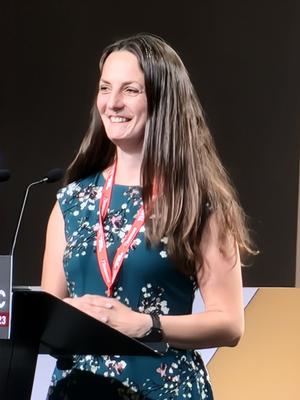
Speaking to a packed room at the Trades Union Coordinating Group’s (TUCG) fringe event on Workers’ rights under a Future Labour government, Hirst discussed action required from the next government in power.
She said:
“Strong commitments are needed to enable more workers to benefit from collective bargaining. The process of achieving a voice at work has to be simple, fair and geared towards the needs of workers. We mustn’t forget those who are freelance or in unrecognised workplaces - those most at risk from the exploitation that is rife in our industry.”
Other speakers on the panel included Justin Madders MP and Paul Fleming, Equity’s general secretary on the importance of collective bargaining.
Motions debated on the day included motion 14 on the closure of ticket offices. Moved by the Bakers Union on behalf of the Disabled Workers Conference, they highlighted the impact of closures on disabled people.
The NUJ has supported the RMT’s Save Our Railway Ticket Offices campaign with the union’s Disabled Members and Equality councils stating plans will jeopardise the safety of NUJ members working late night shifts, impacting those with disabilities or access needs.
NASUWT moved composite one on the campaign against the Minimum Service Levels Bill. Their speaker said: “Congress, we will not stop until this legislation is defeated, consigned to the dustbin of history.”
Tuesday 12 September
Artificial intelligence
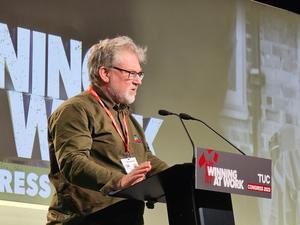
NUJ delegate Steve Bird supporting composite 13 on artificial intelligence in the workplace highlighted the risks of AI to workers, probing “how will we know what is real and what is fake?” Bird called for safeguards around the bias built into algorithms to ensure recruitment processes remained fair without discrimination.
He said:
"Even AI pioneers are warning about the dangers of rapid, unchecked development.
"The race is on where the winners expect to make massive financial gains and the pace is far outstripping any moves to protect or legislate.
"At the heart of this all is data - our data, our words, our photos, our personal details. All of which could be accessible and even sold back to us via algorithms in black box technology.”
Exploring more on the dangers of AI, Bird raised concern about algorithms building in bias and the potential for abuse. White faces, men, and the non-disabled can dominate media and skew HR and recruitment data.
“AI is not just a social phenomenon but could be deployed to strip our employment rights, to intensify our work” he said.
USDAW also speaking on the composite called for a legal framework that focuses on the protections of workers rights with real safeguards against discrimination.
The NUJ responded to the UK government's consultation on AI and is campaigning to ensure journalists including photographers have their rights protected as employers pursue the use of AI. The union is developing resources for members to empower them to protect their work and rights.
Natasha Hirst will speak at the Royal Photographic Society's conference on Artificial Intelligence where she will discuss the importance of preserving editorial integrity and ethics , alongside the need for robust regulation to protect copyright and support the livelihoods of journalists and creatives.
Future of the BBC
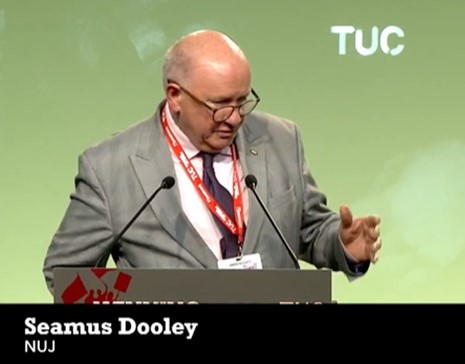
Séamus Dooley, NUJ assistant general secretary, seconded composite 20 on the Future of the BBC. Opening to applause, he said:
“The true value of public service broadcasting is best understood by imagining a British media landscape without the BBC, a landscape dominated by Murdoch and his cronies in a parallel universe where political analysis is dominated by the incisive analysis of the B list cast of GB News.”
Dooley said he was proud of NUJ members who had taken strike action against the cuts to local radio at the BBC. He used his speech as an opportunity to call on trade unionists to remember that BBC workers are public servants and trade union members who have no responsibility for the current crisis.
He said:
“The freezing of the licence fee for a decade was an act of cultural vandalism, a deliberate and strategic undermining of public service broadcasting.
“These attacks are as pernicious in intent as attacks on the NHS, as their failure to adequately fund health, education, welfare, the prison services.”
The NUJ has urged the BBC to undertake an urgent equality impact assessment of the damage to staff at risk of redundancy and to audiences.
The Musicians’ Union (MU) had moved the composite calling the “BBC a daily part in most of our lives.” They said there are 33m listeners to BBC radio live each week with 426m accessing the BBC around the world weekly.
20 per cent of jobs in orchestras have been cut alongside the planned closure of BBC singers. The MU referenced the backlash to these announcements, leading to hope BBC singers now have “a secure future.”
Equity supporting the motion highlighted the need to include audio performers. “Audio actors rarely get the opportunity to have a salaried job” said the speaker. Holiday pay, pension contributions and access to residuals are all key concerns for the union. Equity said they want the BBC licence fee model to be protected so union jobs could be retained, and the BBC able to continue its work in informing, educating and entertaining.
Wednesday 13 September
Motion nine noted that despite the creative industries being one of the drivers of UK GDP, artists and arts workers are often self-employed and experience low pay, precarious work and poor terms and conditions.
Natasha Hirst supporting the motion reaffirmed that representation matters in journalism and the arts. She told conference that through her role as chair of small arts charity disability arts cymru, she was aware of the reliance on grant funding in the arts resulting in short term projects, insecure contracts and precarious working conditions.
She said:
“In common with trade unionism, the arts can send out a beacon call for solidarity and collective action. So, the expectation that creatives will work out of love for what they do, is incredibly damaging. Poor pay makes it much harder for creatives from a minoritised background to make a living.”
Trades councils
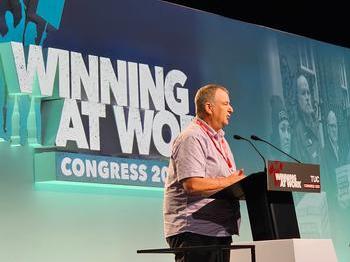
David Nicholson, part of the NUJ’s delegation, spoke on motion 77 about trades councils solidarity.
He said:
“When our members at the BBC and Reach were on strike they were bowled over by the support they got from trades councils organising visits to their picket lines.”
Nicholson reminded conference delegates about the impact on young workers too, who witness the support and recognise the solidarity that the trade union movement provides to each other.
Congress carried the motion encouraging affiliated trade unions to ensure trades councils receive strike dates and updates, in order to show support at pickets and throughout disputes.
Stop the ticket office closures
“There is a fundamental message that too many people still don’t understand – disabled people have the same human rights as everybody else and our lives are every bit as valuable as anyone else’s.” This was the opening of Hirst’s speech supporting emergency motion one: stop the ticket office closures. She said closing ticket offices makes travel inaccessibale and less safe, thus a clear breach of our human rights.
“The inequalities and injustices that we experience as disabled people are systemic. We live and work in a world that is designed to exclude us.”
Calling the closure of ticket offices an example of ableism in practice, she continued:
“Under the UN convention on the rights of disabled people, article 19 sets out our right to independent living. That means that disabled people should have the access and assistance to go about our daily lives with the same freedom as anyone else… as a movement, we know, that when one group comes under attack, all of our rights are at risk.”
Emergency motion one carried.
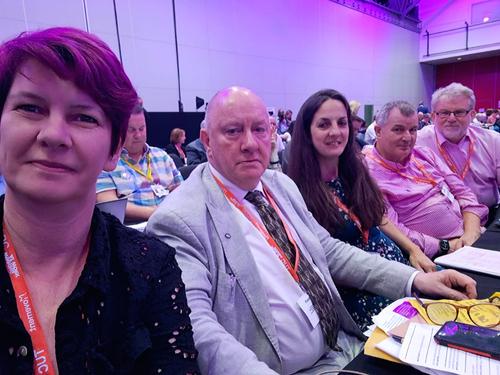
Left to Right: Debbie Cavaldoro, NUJ Extra trustee, Seamus Dooley, NUJ assistant general secretary, Natasha Hirst, NUJ president, David Nicholson, NEC member, Steve Bird, chair, FT group chapel
